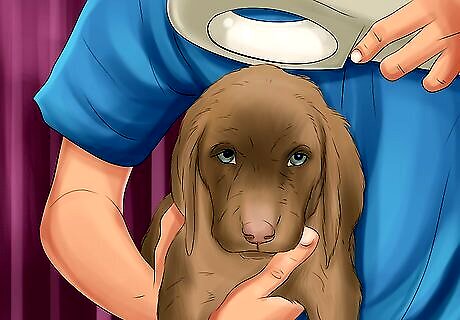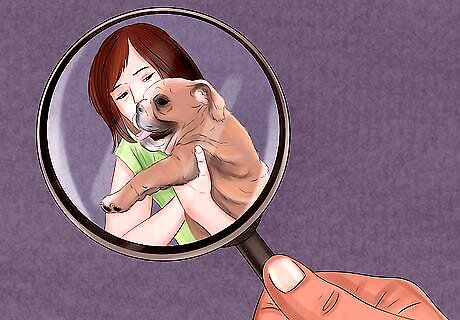
views
Drafting a Pet Care Agreement

Choose a pet guardian. When planning for the care of your pet, you need to choose a person to care for and adopt your pet if you die or are unable to care for the pet. When contemplating whom to choose, consider the following: Choose someone you know well and who you trust to take care of your pet. You may want to choose someone who is in good health and has experience caring for animals. You should talk to whomever you choose and make sure that the are willing and able to care for your pet. If they seem unwilling or reticent to take on the responsibility, it may be best to choose someone else. Consider having a few back-up caregivers for your pet. Circumstances could change and the person you originally chose may no longer be able to care for your pet.

Discuss the care of your pet. Once you and the potential caregiver agree that he or she will care for your pet, you should discuss any specific care requests that you have including: The pet’s groomer and veterinarian. The types of food the pet eats. Any funding that you will provide. While you are not required to pay for the care of your pet, it may be a good idea to set aside a certain amount of money for the care of your animal. This topic is discussed in greater detail below. When leaving instructions for care, you should make them as detailed as possible to help ease the transition of ownership.

Draft a pet care agreement. In order for any agreement to be enforceable, it is must be in writing and signed by both parties. Your agreement should also include: The name of the guardian who will care for your pet and one or two back-up guardians. A statement that both parties agree to the terms of the agreement. A statement that the guardian is undertaking the care of your pet if you become ill and unable to care for the pet or in the event of your death. Any specific instructions for the care of your pet. A clear description of the pet(s) that are the subject of the agreement. That the guardian agrees to adopt the pet and treat the pet as a companion animal. A statement of any funding that you set aside for the pet and how the guardian can receive the funds. A statement of what you are offering the guardian in exchange for caring for your pet. This is called “consideration” and in a contract it is the benefit that a person gets for entering into the contract. Consideration could be a sum of money, or a promise to do something or not do something that you have the right to do.

Sign and notarize the document. Both parties must sign the document and you should consider signing the document in front of a notary public.

Consider attorney review or online legal service. Since you are drafting a legal document, consider having an attorney review your contract before you and the guardian sign it. This ensures that the agreement meets all of the legal requirements for a contract. If you do not want to draft a care agreement on your own or hire an attorney, there are also online services that allow you to construct a legally enforceable pet care agreement. These websites charge between $40 and $400 for a pet care agreement that is tailored to the laws of your state and your own specific requirements.
Creating a Pet Trust

Choose the best type of trust. There are two types of trusts that you can establish for the care of a pet, a testamentary trust or an inter vivos/stand-alone pet trust. A testamentary trust is established through your will, whereas a stand-alone trust can be established during a pet owner’s lifetime and go into effect without probating a will. If cost is a consideration, you should consider setting up a testamentary trust. It is much easier to establish through a will and requires less start-up costs. If you choose a testamentary trust, you should include a provision in your will that gives the executor the power to use estate funds for immediate care of the pet before the pet goes to its new home. You can also set up a joint bank account with the pet guardian so that he or she has some emergency funds to cover the cost of the pet until your will is probated. If you choose to set up an inter vivos trust you will need to hire an experienced trust and estates attorney to set up the trust. This is a more costly choice but you can set up this trust so that it is in effect while you are still alive and there is no delay in distributing the funds upon your death.

Choose a trust beneficiary. The beneficiary of the trust cannot be your pet. The guardian that you choose to care for your pet will become the trust’s beneficiary so you must choose someone that you trust. You should name several additional caretakers should your first caretaker be unable or unwilling to care for your pet. Your pet’s caretaker should not be the same person that you choose to administer your trust (the trustee).

Choose a trustee. A trustee is the person that handles the business of your trust—making sure the payments are made and that the funds are being used for their designated purpose. You should choose alternate trustees just in case the first trustee in unable to carry out their duties. In your will or trust document, the pet owner should bequeath the pet to the trustee with instructions for the trustee to turn over custody to the guardian/caretaker.

Outline funding instructions. As discussed below, you need to calculate the cost of care for your pet and set aside the money or assets to fund the trust. Your trust document should also describe how and when the trustee should pay the guardian. When funding a trust, a pet owner should consider: The standard of living that he or she wants for the pet. The amount and timing of distributions for the care of the pet. Whether there will be any distributions for the guardian. This may be a good idea if caring for the pet is burdensome.

Identify the pet. It is very important that you clearly and specifically identify the animal that is meant to be cared for under the trust. An unscrupulous guardian could continue to take funds even after your animal dies by purchasing a replacement pet. While this is fraudulent conduct, it would be difficult to prove without a clear and specific description of your pet.

Instruct the trustee to check on your pet. As part of the trustee’s duties, you can require that they regularly check on the well being of your pet. This ensures that your funds are being used for the designated purpose and that your pet is being provided for and cared for in the manner that you wished.

Create the trust. Once you have decided on all of the above components of the trust as well as the assets that you will use to fund the trust, you are ready for the trust to be created. You must make sure that the trust complies with your state law. You can view state law regarding pet trusts at: https://www.aspca.org/pet-care/pet-planning/pet-trust-laws. For an inter vivos trust, you should hire an estate attorney to establish the trust. If you are creating a testamentary trust, you can view sample testamentary trust language at: http://www2.nycbar.org/pdf/report/uploads/8_20072453-ProvidingforYourPetintheEventofDeathHospitalization.pdf.
Making a Bequest in Your Will

Consider using a will to provide for a pet. A will disburses your property after you die. Under the law, a pet is considered your legal property and you can use your will to make certain provisions for your pet upon your death.

Draft a will provision. There are several ways that you can provide for your pet through your will, including a temporary home with instructions for placement, a gift of your pet and funds to support the pet’s care, or a gift to a humane shelter. Generally, your will provision should include the following elements: You should state that you are giving your pet to a specific person or organization and provide the person/organization’s name and address. You should clearly identify the pet or pets and whether one person or several people will care for the pets. You should state that the pet is meant to be a companion animal. You should identify more than one person to care for your pet in case the first person is unable or unwilling. If you choose an organization to care for your pet, you should provide specific instructions, such as: placing the animals in foster care until a home is found; providing appropriate veterinary care; and contact information for a relative who the shelter can contact if they are unable to find a permanent home for the animals. You should make a specific monetary bequest to an organization or person charged with caring for your pet. You must request, not direct, that funds given to a person along with your pet be used for the care of your pet. You can direct your executor to use any funds he or she deems necessary to care for your pet. To view sample will pet provisions visit: http://www2.nycbar.org/pdf/report/uploads/8_20072453-ProvidingforYourPetintheEventofDeathHospitalization.pdf

Hire an attorney. You should have a trust and estates attorney draft the will provision for you or at least review any provision that you draft to ensure that it complies will all applicable laws and affords the protections that you desire. You can view state laws at: http://estate.findlaw.com/planning-an-estate/state-laws-estates-probate.html.

Contemplate benefits and drawbacks. If you choose to use a will to make arrangements for your pet, there are a number of factors that you should consider. You must make arrangements for someone to care for your pet during the time that your will is reviewed by the court and your assets distributed. A will only goes into effect upon your death and can not ensure that your pet is cared for during your lifetime if you are too ill to care for the pet yourself. Some states will only recognize a simple pet provision as “honorary” and the court is not obligated to ensure the money you bequeathed to a person for the pet’s care will actually go to the care of the pet. If you are already drafting a will, it may be cost effective to include a provision for your pet in that document. You should consider making a conditional bequest, which means that the animal and a sum of money are left to a person who must use the money to care for the pet. The executor of the will is charged with ensuring that the money is used appropriately. You must check your state’s trust and estates laws to ensure that conditional bequests are allowed.
Establishing Funding For a Pet’s Care

Identify funds for your pet. While you are not required to provide funds in a pet care agreement, by doing so you can make sure that you pet is well cared for during the remainder of its life. You can provide funds from a variety of sources including: A fixed amount or percentage from an insurance policy. A portion of a bank account. A portion of a retirement account. From the sale of other assets in your estate.

Calculate the cost of pet care. When calculating the amount of money to set aside for the care of your pet, consider the following: The current cost of caring for your pet and the animal’s life expectancy. That pets often become more expensive as they age and may need more costly medical care. The number of pets included in the pet care agreement or pet trust. Whether funds will be used to compensate the guardian and if so, the amount you want to set aside for the guardian. The cost of transportation, if any, for the pets to get to the new guardian.

Establish a distribution representative. A distribution representative is a person legally responsible for managing the funds that you set aside for your pet. They would make distributions to the pet’s guardian and once the pet is deceased, they would follow your wishes as to what to do with the remainder of your funds. In the case of a trust, this persons is referred to as the trustee. While you could choose the pet guardian as the distribution representative/trustee, it may be better to have a third party in charge of the funds. A distribution representative/trustee can check to make sure that the funds are being used for your pet and not some other purpose.

Choose a reminder beneficiary. For both a trust and a care agreement, you should choose a beneficiary to receive any funds left after your pet dies. Pet owners are discouraged from leaving the remaining funds to the guardian. A guardian with a financial stake in your pet’s death may not provide the best care. You could leave your funds to a charity that works to protect the well-being of animals.


















Comments
0 comment